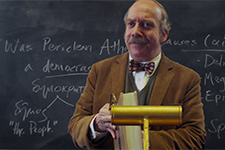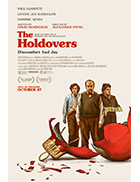The Holdovers
|  The Holdovers is Alexander Payne’s first film since the ambitious, but disappointing speculative sci-fi satire Downsizing (2017), and it is a welcome return to form and a continuation of his emotional and thematic growth from dark cynicism to a cautiously guarded optimism. It is ironic, then, that some critics are accusing Payne of being overly sentimental and even schmaltzy, as if making a film that seeks to find some redeeming qualities in otherwise difficult characters is some kind of fundamental artistic flaw. The film also marks his reunion with Paul Giamatti, who played the main character in Payne’s best film to date, Sideways (2004). The Holdovers is also, along with Nebraska (2013), the only feature Payne has directed that he didn’t have some hand in writing (usually with Jim Taylor, with whom he shared an Oscar for writing Sideways). Some critics may chafe at the fact that The Holdovers was written by David Hemingson, who has never written a feature film before, but has written and produced tons of television since the early 1990s, including Whiskey Cavalier, Kitchen Confidential, and Just Shoot Me! (apparently the original idea was Payne’s, although he doesn’t receive a story credit). All those years in television, with its attachment to formula and familiarity, has certainly affected Hemingson’s writing style, and The Holdovers is clearly assembled from bits and pieces of just about every boarding prep school film ever made (of course, given the extensive range of that subgenre, how could it not?). The film doesn’t do anything particularly new, but what it does it does very well, and it gives us a growing sense of humanity in its characters that feels earned, rather than forced. Payne has long centered his films on intriguing, sometimes infuriating, but always interesting and compelling protagonists (something he did not do in Downsizing), and he has a doozy of a protagonist in Giamatti’s Paul Hunham, a curmudgeonly boarding school classics teacher who carries a chip on his shoulder the size of the collected works of Cicero. He is a man who is well educated in literature and history, but woefully unprepared for genuine human contact. He puts on appearances of being a member of the upper crust, especially with the large pipe he smokes, but he drinks Jim Beam and is generally slovenly in his living quarters. He also has a prominent lazy eye, which gives him the appearance of being slightly deranged (in an amusing quirk, Giamatti switches which eye is lazy, which makes it continually surprising). Hunham is loathed by all the students at the fictional Barton Academy, a snowbound Massachusetts prep school that has been around since 1797 and funnels rich young men into the Ivy League, whether they deserve it or not. The difference between Hunham and many similarly difficult cinematic prep school professors is that, far being a beacon of noble truth and enlightenment, he despises the students as much as they despise him and does little to hide it. He has his reasons for hating rich brats, beyond just the general annoyance that accompanies teenagers who have done nothing to earn their wealth and status, which is one of the many things we come to know and understand about him as the film unfolds. Set in 1970, the film’s title refers to those who have to stay behind at Barton over the two-week Christmas holiday, when the rest of the faculty, staff, and students go home to be with their families. One teacher is tasked with watching over the students who must stay behind, and this year Hunham’s number is up. Along with Mary Lamb (Da’Vine Joy Randolph), the school’s African-American head cook whose son was able to go to Barton due to her position on the staff but was recently killed in Vietnam because he couldn’t afford to go to college without the GI Bill, Hunham must look after a quintet of students. Chief among them is Angus Tully (Dominic Sessa), a tall, lanky senior whose recently remarried mother would rather spend the Christmas holidays vacationing with her new husband than being at home with him (he had been promised an island holiday, which makes his being held over all the more infuriating). At first there are four other students there, as well, including Teddy Kountze (Brady Hepner), the epitome of white privileged snobbery, a Morman kid whose parents are on a mission trip, and a Korean exchange student, but a plot development ensures that Hunham is eventually alone with Angus, thus setting up an odd-couple conflict of middle-age and teenage anger, resentment, and frustration that eventually boils over into mutual understanding, if not regard. Like many of Payne’s films, a road trip is involved, in this case to Boston, where most of the characters’ intensely hidden secrets come out, especially at an awkward Christmas party thrown by the perpetually upbeat Miss Lydia Crane (Carrie Preston), the school’s office manager. True to its time and place, Payne has gone out of his way to give The Holdovers the look and feel of a film not just set in 1970, but made in 1970, complete with period-appropriate Universal logo and MPA rating card, lengthy opening credits, digitally imposed film grain and celluloid defects, and a soundtrack of would-be hits that feel like they’re playing somewhere on vinyl. Payne and cinematographer Eigil Bryld have carefully calibrated the film’s look and feel to the Nixon era, throwing in occasional sudden zooms and eschewing any shots that a big, bulky 35mm camera couldn’t have captured. The result is a film that looks of its time and place, which we could write off as simply a stylistic gimmick if it didn’t work so well with the material. Anchored by Giamatti’s compelling central performance, which makes it all too clear how Hunham uses his brusque exterior to hide a world of deep pain within, The Holdovers takes a meaningful dive into a complex world of emotional conflict, reminding us that surfaces are just that. Copyright © 2024 James Kendrick Thoughts? E-mail James Kendrick All images copyright © Universal |
Overall Rating: 


 (3.5)
(3.5)


